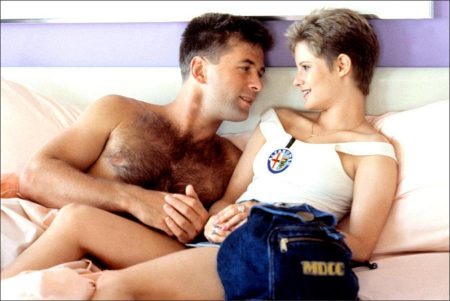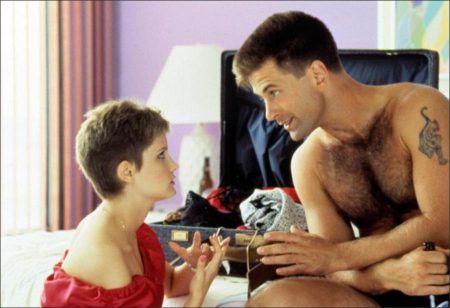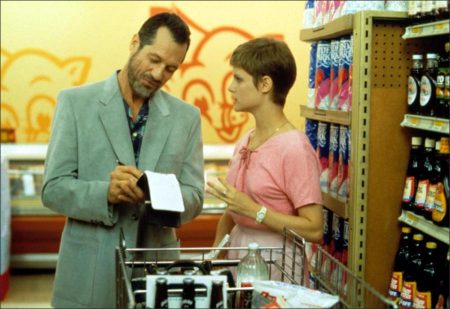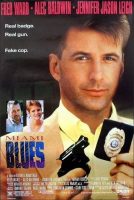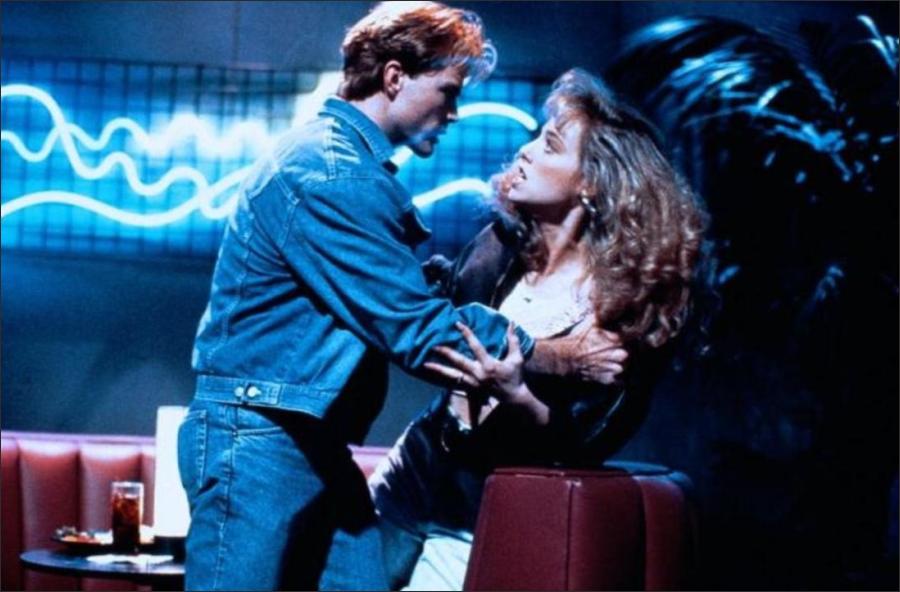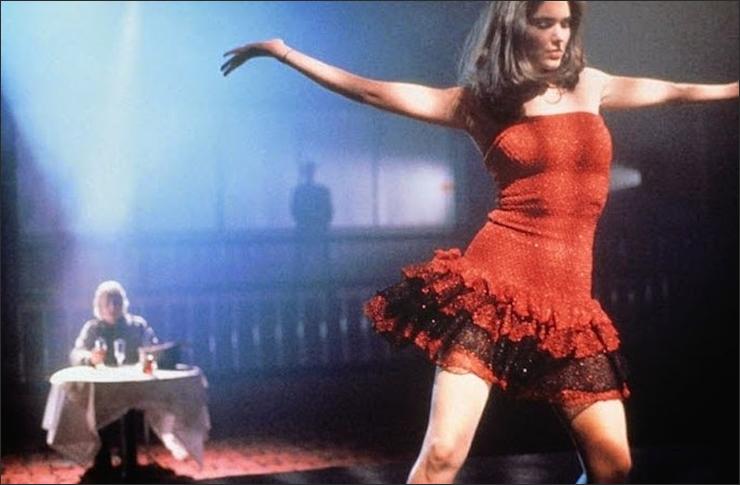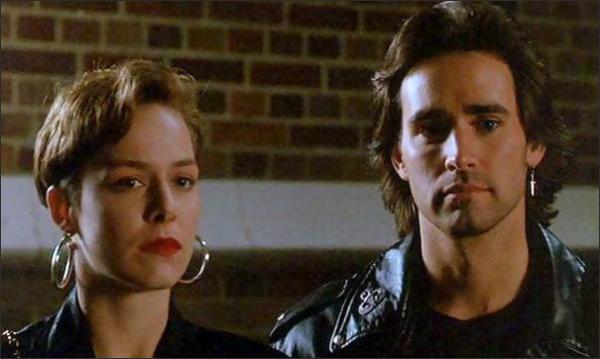Taglines: Real badge. Real gun. Fake cop.
Miami Blues movie storyline. After Junior (Alec Baldwin) is released from prison, he plans on starting a new life in Miami. But when he kills a man in the airport, he flees the scene and finds Susie (Jennifer Jason Leigh), a mild-mannered prostitute searching for stability. The two opposites become romantically involved, and Junior steals a badge and gun from a veteran detective (Fred Ward). Using the officer’s identity, Junior embarks on a crime spree and convinces Susie that he is the perfect man.
Miami Blues stars Alec Baldwin, fresh from “The Hunt For Red October,” as Fred Frenger, an ex-con who has just arrived in Miami looking for a fresh start. He gets started off on the wrong foot. At the airport, he’s approached by a Hare Krishna, and he bends the guy’s finger back until it breaks. Not nice, especially since the cult member dies of shock.
Frenger is a thief, con man and cheat. He also is incredibly reckless and will get himself into situations a dopey high school kid would know enough to avoid. He wanders through the world looking for suitcases to steal, wallets to lift, identification papers he can use.
Nothing much is planned, and most of his jobs depend on sheer blind luck. One piece of luck, sort of, is when he meets Susie, a hooker played by Jennifer Jason Leigh. She’s a student at Dade Junior College, working her way through school, and she isn’t very bright. In fact, she’s so slow to catch on that conversation with her involves saying things, and then explaining them, and then telling her it doesn’t matter anyway.
Fred Ward is Sgt. Hoke Moseley, assigned to the case. His life is composed of equal parts of indigestion, alimony and bureaucracy. Some simpleminded detective work leads him to Frenger. Fred and Susie, now living together, invite him to dinner and he stays gratefully, eating their chops and drinking their beer and belching cheerfully. He figures maybe Frenger broke the Hare Krishna’s fingers but didn’t mean to kill him, and, truth to tell, he isn’t very worked up over the case – not until Frenger visits his hotel room, beats him senseless and steals his badge, gun and false teeth. That’s going too far.
Armed with identification as a cop, Frenger turns into a loose cannon, free-lancing all over town. He busts up robberies, steals from previous victims, flashes his badge and takes advantage of that split-second of doubt and guilt that’s felt by the average citizen when anybody flashes a badge. And then the situation escalates as Frenger stupidly gets into more and more trouble, and Susie – who never was a very good hooker, but has convinced herself she could be a good wife – slowly realizes she is living with a very dangerous man.
Miami Blues is a 1990 American neo-noir black comedy crime film based on the novel of the same name by Charles Willeford. It stars Fred Ward, Alec Baldwin, Jennifer Jason Leigh, Cecilia Pérez-Cervera, Georgie Cranford, Edward Saxon, Charles Napier and Wendy Thorlakson. It was directed by George Armitage. Ward was also the executive producer.
Film Review for Miami Blues
An early scene in ”Miami Blues” finds three characters sharing a hearty dinner: Susie Waggoner (Jennifer Jason Leigh), a good-hearted and very newly retired prostitute who just loves to cook; Junior Frenger (Alec Baldwin), a dashing, reckless sociopath who has latched onto Susie during the course of a crime spree, and police Detective Hoke Moseley (Fred Ward), who suspects Junior may have killed someone and has stopped by to ask a few questions. Which member of this trio is the most peculiar?
It’s Hoke, of course, the antihero of Charles Willeford’s crackerjack series of crime novels, written in the droll, unpredictable manner of Elmore Leonard but graced with a sharply evoked seediness all their own. A detective on duty doesn’t ordinarily load up on the suspect’s dinner and beer, but then Hoke is no ordinary detective. He’s a broke, beleaguered veteran who loves shocking suspects by taking out his false teeth in their presence, and whose wiliness generates many other tricks for catching criminals off-guard. It takes a while to realize that Hoke should have been the central figure in George Armitage’s film version of ”Miami Blues,” though he is not.
Instead, Mr. Armitage concentrates primarily on Junior, an understandable decision in view of Mr. Baldwin’s movie-star magnetism but a shaky one where the overall film is concerned. In this and other respects, the otherwise piquant ”Miami Blues” is strangely off-balance, as if little thought had been given to the way in which separate aspects of its story affect one another. Mr. Armitage seems to give equal weight, for instance, to Hoke’s taking out his teeth on various occasions and to Junior’s losing three fingers in a climactic holdup scene (a scene that floors the unsuspecting audience, incidentally). The most novel aspect of that holdup, the fact that Junior is mad dog enough to steal a ring right after losing his fingers, is pretty much thrown away.
”Miami Blues” hooks the viewer’s attention with its first glimpses of the ruthless Junior and his utter obliviousness to danger. Early in the story he is seen forging signatures, breaking the finger of a Hare Krishna cult member, stealing a woman’s suitcase at the airport, asking a hotel bellhop to send him a prostitute, and then trying to sell the prostitute the stolen clothes.
The prostitute turns out to be Susie, Junior turns out to be newly out of prison, and soon they have embarked upon what ought to be a new life. In Willeford’s version, there are even more perverse twists to this story: the Hare Krishna, who dies of shock, turns out to be Susie’s brother who is skimming Hare Krishna funds in order to buy a custom-decorated white Trans Am. The film tries hard, but it just can’t keep up with craziness like that.
”Miami Blues” is best appreciated for the performances of its stars and for the kinds of funny, scene-stealing peripheral touches that keep it lively even when it’s less than fully convincing. Mr. Baldwin, whose Junior sports a tiger tattoo and favors black satin shorts for the story’s at-home scenes, affects a raspy growl and does his best to seem dangerous; at times he truly succeeds. The trouble with casting an actor with this much matinee-idol potential in a role like this, though, is that the audience expects to like Junior better than it ever will. Miss Leigh, on the other hand, steals every scene with Susie’s impossible ingenuousness, and radiates a sweet hopefulness that in a story like this is certain to be dashed.
Mr. Ward, as Hoke, seems a lot more potentially scary than Junior does, and mixes the comical, foxy and sleazy sides to Hoke’s character in a riveting way. Equally good are Charles Napier, as the detective partner who consoles Hoke when Junior steals his badge and starts impersonating an officer (”Maybe you should wait and let him solve a couple more from your caseload, huh?”), Obba Babatunde as the bogus blind man who is Hoke’s favorite informer, and Nora Dunn as the coolly elegant policewoman who might well become the woman in Hoke’s private life, if he ever has one.
Though Mr. Armitage’s direction is more workmanlike than wild, it incorporates its share of inspired minor touches. Among these are the restaurant featuring water ballet entertainment, the way that Susie struggles her way through a painful moment while reciting a favorite recipe, the odd indications that Junior is an ex-con (he has never tasted yogurt), and the particularly evocative glimpses of the title city. A sunset shot of cruise ships juxtaposed with prowling dogs offers the film’s impression of Miami in a nutshell.
Miami Blues (1990)
Directed by: George Armitage
Starring: Fred Ward, Alec Baldwin, Jennifer Jason Leigh, Cecilia Pérez-Cervera, Georgie Cranford, Edward Saxon, Charles Napier, Wendy Thorlakson
Screenplay by: George Armitage
Production Design by: Maher Ahmad
Cinematography by: Tak Fujimoto
Film Editing by: Craig McKay
Costume Design by: Eugenie Bafaloukos
Set Decoration by: Don K. Ivey
Music by: Gary Chang
Distributed by: Orion Pictures
Release Date: April 20, 1990
Hits: 113
